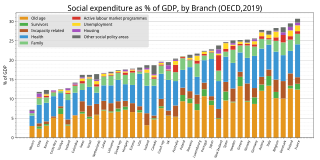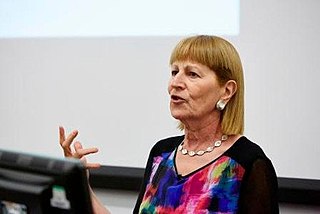
The division of labour is the separation of tasks in any economic system or organisation so that participants may specialise (specialisation). Individuals, organizations, and nations are endowed with or acquire specialised capabilities and either form combinations or trade to take advantage of the capabilities of others in addition to their own. Specialised capabilities may include equipment or natural resources as well as skills and training and combinations of such assets acting together are often important. For example, an individual may specialise by acquiring tools and the skills to use them effectively just as an organization may specialize by acquiring specialised equipment and hiring or training skilled operators. The division of labour is the motive for trade and the source of economic interdependence.

Feminist economics is the critical study of economics and economies, with a focus on gender-aware and inclusive economic inquiry and policy analysis. Feminist economic researchers include academics, activists, policy theorists, and practitioners. Much feminist economic research focuses on topics that have been neglected in the field, such as care work, intimate partner violence, or on economic theories which could be improved through better incorporation of gendered effects and interactions, such as between paid and unpaid sectors of economies. Other feminist scholars have engaged in new forms of data collection and measurement such as the Gender Empowerment Measure (GEM), and more gender-aware theories such as the capabilities approach. Feminist economics is oriented towards the goal of "enhancing the well-being of children, women, and men in local, national, and transnational communities."

The welfare state is a form of government in which the state protects and promotes the economic and social well-being of its citizens, based upon the principles of equal opportunity, equitable distribution of wealth, and public responsibility for citizens unable to avail themselves of the minimal provisions for a good life. Sociologist T. H. Marshall described the modern welfare state as a distinctive combination of democracy, welfare, and capitalism.
Economic freedom, or economic liberty, is the ability of people of a society to take economic actions. This is a term used in economic and policy debates as well as in the philosophy of economics. One approach to economic freedom comes from the liberal tradition emphasizing free markets, free trade, and private property under free enterprise. Another approach to economic freedom extends the welfare economics study of individual choice, with greater economic freedom coming from a larger set of possible choices. Other conceptions of economic freedom include freedom from want and the freedom to engage in collective bargaining.

Parental leave, or family leave, is an employee benefit available in almost all countries. The term "parental leave" may include maternity, paternity, and adoption leave; or may be used distinctively from "maternity leave" and "paternity leave" to describe separate family leave available to either parent to care for small children. In some countries and jurisdictions, "family leave" also includes leave provided to care for ill family members. Often, the minimum benefits and eligibility requirements are stipulated by law.

Poverty reduction, poverty relief, or poverty alleviation, is a set of measures, both economic and humanitarian, that are intended to permanently lift people out of poverty.

The capability approach is a normative approach to human welfare that concentrates on the actual capability of persons to achieve their well-being rather than on their mere right or freedom to do so. It was conceived in the 1980s as an alternative approach to welfare economics. In this approach, Amartya Sen and Martha Nussbaum bring together a range of ideas that were previously excluded from traditional approaches to the economics of welfare. The core focus of the capability approach is on what individuals are able to do.
The degree of labour market flexibility is the speed with which labour markets adapt to fluctuations and changes in society, the economy or production. This entails enabling labour markets to reach a continuous equilibrium determined by the intersection of the demand and supply curves.

Nancy Folbre is an American feminist economist who focuses on economics and the family, non-market work and the economics of care. She is Professor of economics at the University of Massachusetts Amherst.

The Nordic model comprises the economic and social policies as well as typical cultural practices common to the Nordic countries. This includes a comprehensive welfare state and multi-level collective bargaining based on the economic foundations of social corporatism, with a high percentage of the workforce unionized and a sizable percentage of the population employed by the public sector. Although it was developed in the 1930s under the leadership of social democrats, the Nordic model began to gain attention after World War II.

Women in Libya are women who were born in, who live in, or are from Libya.

Judy Wajcman, is the Anthony Giddens Professor of Sociology at the London School of Economics and Political Science. She is the Principal Investigator of the Women in Data Science and AI project at The Alan Turing Institute. She is also a Visiting Professor at the Oxford Internet Institute. Her scholarly interests encompass the sociology of work, science and technology studies, gender theory, and organizational analysis. Her work has been translated into French, German, Greek, Italian, Korean, Japanese, Portuguese, Russian, Chinese and Spanish. Prior to joining the LSE in 2009, she was a Professor of Sociology in the Research School of Social Sciences at the Australian National University. She was the first woman to be appointed the Norman Laski Research Fellow (1978–80) at St. John's College, Cambridge. In 1997 she was elected Fellow of the Academy of the Social Sciences in Australia.

Unpaid labor is defined as labor that does not receive any direct remuneration. This is a form of 'non-market work' which can fall into one of two categories: (1) unpaid work that is placed within the production boundary of the System of National Accounts (SNA), such as gross domestic product (GDP), and (2) unpaid work that falls outside of the production boundary, such as domestic labor that occurs inside households for their consumption. Unpaid labor is visible in many forms and isn't limited to activities within a household. Other types of unpaid labor activities include volunteering as a form of charity work and interning as a form of unpaid employment.
Laiko Vima is a bi-weekly newspaper published in Gjirokastër, that serves the local Greek communities in Albania. It was founded in 1945 and was the only newspaper printed in the Greek language during the Socialist People's Republic of Albania.
The breadwinner model is a paradigm of family centered on a breadwinner, "the member of a family who earns the money to support the others." Traditionally, the earner works outside the home to provide the family with income and benefits such as health insurance, while the non-earner stays at home and takes care of children and the elderly.

James Mahmud Rice is an Australian sociologist in the Demography and Ageing Unit, Melbourne School of Population and Global Health, University of Melbourne. He works at the intersection of sociology, economics, and political science, focusing in particular on inequalities in the distribution of economic resources such as income and time and how private and public conventions and institutions shape these inequalities. In 2009 he was awarded the Stein Rokkan Prize for Comparative Social Science Research.
In political philosophy, a throffer is a proposal that mixes an offer with a threat which will be carried out if the offer is not accepted. The term was first used in print by political philosopher Hillel Steiner; while other writers followed, it has not been universally adopted and it is sometimes considered synonymous with carrot and stick. Though the threatening aspect of a throffer need not be obvious, or even articulated at all, an overt example is: "Kill this man and receive £100; fail to kill him and I'll kill you."
Susan 'Sue' Felicity Himmelweit, is a British economist, emeritus professor of economics for the Open University in the UK, and was the 2009 president of the International Association for Feminist Economics (IAFFE).

Robert 'Bob' E. Goodin was Professor of Government at the University of Essex and is now Distinguished Professor of Philosophy and Social and Political theory at the Australian National University.

Women's empowerment is the process of empowering women. It may be defined in several ways, including accepting women's viewpoints or making an effort to seek them, raising the status of women through education, awareness, literacy, and training. Women's empowerment equips and allows women to make life-determining decisions through the different problems in society. They may have the opportunity to redefine gender roles or other such roles, which in turn may allow them more freedom to pursue desired goals.


















